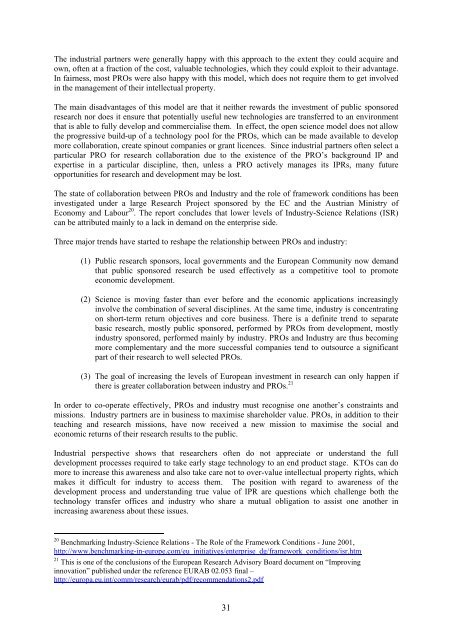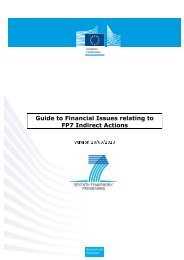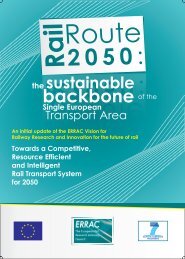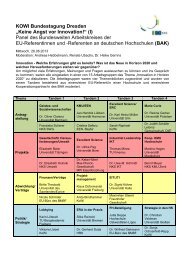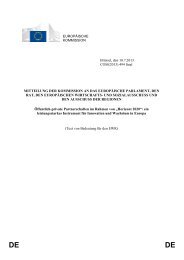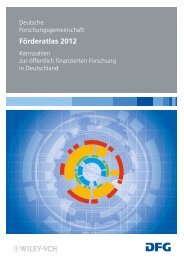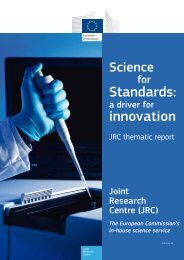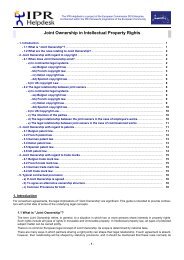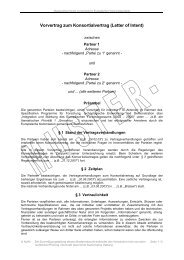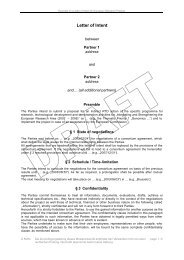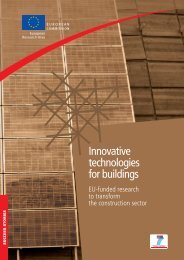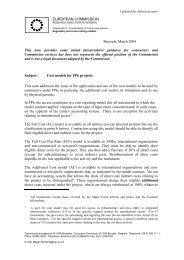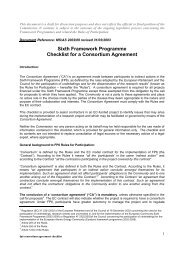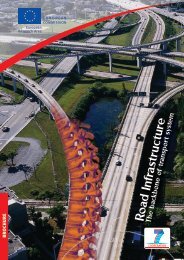Expert Group Report Management of Intellectual Property in ... - KoWi
Expert Group Report Management of Intellectual Property in ... - KoWi
Expert Group Report Management of Intellectual Property in ... - KoWi
You also want an ePaper? Increase the reach of your titles
YUMPU automatically turns print PDFs into web optimized ePapers that Google loves.
The <strong>in</strong>dustrial partners were generally happy with this approach to the extent they could acquire and<br />
own, <strong>of</strong>ten at a fraction <strong>of</strong> the cost, valuable technologies, which they could exploit to their advantage.<br />
In fairness, most PROs were also happy with this model, which does not require them to get <strong>in</strong>volved<br />
<strong>in</strong> the management <strong>of</strong> their <strong>in</strong>tellectual property.<br />
The ma<strong>in</strong> disadvantages <strong>of</strong> this model are that it neither rewards the <strong>in</strong>vestment <strong>of</strong> public sponsored<br />
research nor does it ensure that potentially useful new technologies are transferred to an environment<br />
that is able to fully develop and commercialise them. In effect, the open science model does not allow<br />
the progressive build-up <strong>of</strong> a technology pool for the PROs, which can be made available to develop<br />
more collaboration, create sp<strong>in</strong>out companies or grant licences. S<strong>in</strong>ce <strong>in</strong>dustrial partners <strong>of</strong>ten select a<br />
particular PRO for research collaboration due to the existence <strong>of</strong> the PRO’s background IP and<br />
expertise <strong>in</strong> a particular discipl<strong>in</strong>e, then, unless a PRO actively manages its IPRs, many future<br />
opportunities for research and development may be lost.<br />
The state <strong>of</strong> collaboration between PROs and Industry and the role <strong>of</strong> framework conditions has been<br />
<strong>in</strong>vestigated under a large Research Project sponsored by the EC and the Austrian M<strong>in</strong>istry <strong>of</strong><br />
Economy and Labour 20 . The report concludes that lower levels <strong>of</strong> Industry-Science Relations (ISR)<br />
can be attributed ma<strong>in</strong>ly to a lack <strong>in</strong> demand on the enterprise side.<br />
Three major trends have started to reshape the relationship between PROs and <strong>in</strong>dustry:<br />
(1) Public research sponsors, local governments and the European Community now demand<br />
that public sponsored research be used effectively as a competitive tool to promote<br />
economic development.<br />
(2) Science is mov<strong>in</strong>g faster than ever before and the economic applications <strong>in</strong>creas<strong>in</strong>gly<br />
<strong>in</strong>volve the comb<strong>in</strong>ation <strong>of</strong> several discipl<strong>in</strong>es. At the same time, <strong>in</strong>dustry is concentrat<strong>in</strong>g<br />
on short-term return objectives and core bus<strong>in</strong>ess. There is a def<strong>in</strong>ite trend to separate<br />
basic research, mostly public sponsored, performed by PROs from development, mostly<br />
<strong>in</strong>dustry sponsored, performed ma<strong>in</strong>ly by <strong>in</strong>dustry. PROs and Industry are thus becom<strong>in</strong>g<br />
more complementary and the more successful companies tend to outsource a significant<br />
part <strong>of</strong> their research to well selected PROs.<br />
(3) The goal <strong>of</strong> <strong>in</strong>creas<strong>in</strong>g the levels <strong>of</strong> European <strong>in</strong>vestment <strong>in</strong> research can only happen if<br />
there is greater collaboration between <strong>in</strong>dustry and PROs. 21<br />
In order to co-operate effectively, PROs and <strong>in</strong>dustry must recognise one another’s constra<strong>in</strong>ts and<br />
missions. Industry partners are <strong>in</strong> bus<strong>in</strong>ess to maximise shareholder value. PROs, <strong>in</strong> addition to their<br />
teach<strong>in</strong>g and research missions, have now received a new mission to maximise the social and<br />
economic returns <strong>of</strong> their research results to the public.<br />
Industrial perspective shows that researchers <strong>of</strong>ten do not appreciate or understand the full<br />
development processes required to take early stage technology to an end product stage. KTOs can do<br />
more to <strong>in</strong>crease this awareness and also take care not to over-value <strong>in</strong>tellectual property rights, which<br />
makes it difficult for <strong>in</strong>dustry to access them. The position with regard to awareness <strong>of</strong> the<br />
development process and understand<strong>in</strong>g true value <strong>of</strong> IPR are questions which challenge both the<br />
technology transfer <strong>of</strong>fices and <strong>in</strong>dustry who share a mutual obligation to assist one another <strong>in</strong><br />
<strong>in</strong>creas<strong>in</strong>g awareness about these issues.<br />
20 Benchmark<strong>in</strong>g Industry-Science Relations - The Role <strong>of</strong> the Framework Conditions - June 2001,<br />
http://www.benchmark<strong>in</strong>g-<strong>in</strong>-europe.com/eu_<strong>in</strong>itiatives/enterprise_dg/framework_conditions/isr.htm<br />
21 This is one <strong>of</strong> the conclusions <strong>of</strong> the European Research Advisory Board document on “Improv<strong>in</strong>g<br />
<strong>in</strong>novation” published under the reference EURAB 02.053 f<strong>in</strong>al –<br />
http://europa.eu.<strong>in</strong>t/comm/research/eurab/pdf/recommendations2.pdf<br />
31


